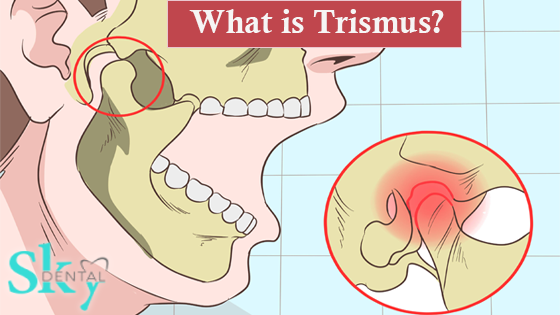Trismus is also known as lockjaw, is a painful condition in which the jaws do not open fully i.e., ( chewing muscles of jaw become contracted and inflamed, preventing the mouth from wide opening). Along with the pain, trismus can lead to serious health problems including difficulty in speaking, reduced nutrition and compromised oral hygiene.
Trismus is commonly seen in people who had oral surgery, infection, radiation for head and neck cancer. Also, it can impact the quality of life in different ways. Communication is more difficult for the person who is suffering with trismus. However, it is not only difficult to speak with a partly closed mouth but it can decrease the vocal quality and also the size of the resonating oral cavity. As a result, it also makes chewing and swallowing difficult, also risk of increased aspiration.
Causes of Trismus
Trismus can result from trauma, oral surgery, radiation treatment and even TMJ problems. The limitation in opening mouth may be the result of joint damage, muscle damage, growth of connective tissue or combination of these factors.
Trauma
Any damage to the jaw can lead to trismus. Examples of such trauma are fractured jaw bones or tissue damage.
- Swelling of temporomandibular joint.
- A collection of blood outside the blood vessels i.e., hematoma
- Damage to mastication muscles.
Oral Surgery
Trismus can also result from oral surgery like after the extraction of wisdom teeth especially the lower wisdom teeth. Oral surgery may also cause inflammation in the mouth which leads to trismus. Also the hypertension of opening the mouth wider than its original range of motion during surgery can also lead to lockjaw.
Temporomandibular Joint Disorder
Each side of the human jaw consists of a Temporomandibular joint. This joint connects your jaw to your skull and allows you to open and close your mouth. Hence, dysfunction in the joint can cause trismus and pain. Joint dysfunction can occur due to trauma, genetics, arthritis and habitual clenching and grinding of teeth.
Infections
In some cases, Infections may also lead to trismus. Here are some types of infections that may include
- Tetanus
- Mumps
- Peritonsillar abscess
- Tonsillitis
- Other types of abscess
Radiation Treatment for Cancer
Cancerous tumors in the head or throat can affect the function of the jaw and this leads to trismus. But it commonly occurs due to radiation of cancer involving the jaw.
According to the Oral Cancer Foundation, 10-40 % of the people having head or throat cancer receiving radiation treatment will lead to trismus. Radiation that affects the TMJ, or masseter muscle is most likely to cause lockjaw.
Signs and Symptoms of Trismus
The most common effect of trismus is difficulty in opening the mouth. However, for the patients who are suffering with cancer, this frequently results from scar tissue from radiation or surgery. While lockjaw is caused by radiation treatment, patients also frequently present with Xerostomia, mucositis, and pain as a result of radiation burns. Also the other associated symptoms are
- Headache and ear ache
- Jaw pain even without moving the jaw
- Cramping
- Difficulty or discomfort in performing the activities like brushing, chewing, biting and swallowing.
Treatment
Trismus is more temporary than permanent. The earlier you start the treatment, the better the chances for recovery.
Treatment options include:
Medication
Medications can help to reduce the pain and relax the jaw muscles.And depending upon the status of the jaw and severity in symptoms, your doctor may recommend common oral medications for trismus including muscle relaxers and nonsteroidal anti-inflammatory drugs to relieve the pain.
Usage of Jaw-stretching device
This device may fit between the upper and lower jaw. According to the studies, people who use jaw-stretching devices while performing specific mouth exercises have an increase in mouth opening by 5-10mm.
Change in diet
Moving to a soft food diet until the symptoms improve is helpful because it is possible to eat soft foods without stretching the mouth wide.
Soft foods like
- Yogurt
- Smoothies
- Oatmeal
- fish
- Cheese
- Beans
- Mashed potatoes
- Steamed vegetables
- Clambered eggs
- Stewed fruits
How to manage trismus at home?
Along with medical intervention, there are things you can do at home to help relieve trismus and prevent it from worsening.
- Massaging i.e., moving your fingers in a circular motion at the areas of your jaw that are painful for about 30 seconds
- Move your jaw in a circular motion i.e., 5 circles to left and 5 to the right
- Open your mouth as much as you can, holding this position to stretch it for a few seconds
- Move your jaw left to right for a few minutes and then right to left.
- Stretch your neck and tuck your chin into your chest for 30 seconds. And then bring your head back and hold for 30 seconds. Likewise, move your head to left and right. Consequently rotate your head in circular motion.
Finally, trismus is the most painful condition involved in the reduction of mouth size opening between the jaws. Most of the trismus cases are temporary. However, medications and physical therapy can effectively eliminate trismus and reduce complications.
Sky Dental hospital in Vijayawada provides high-quality dentistry & also artistic skills that can improve a person’s health, smile, and confidence. Sky Dental Provides services like Root canal treatment, Gum Treatment, Implants, Oral and Maxillofacial Surgery, Full mouth Rehabilitation and much more. Apart from this, there is a separate ward for any dental problems related to Children.


